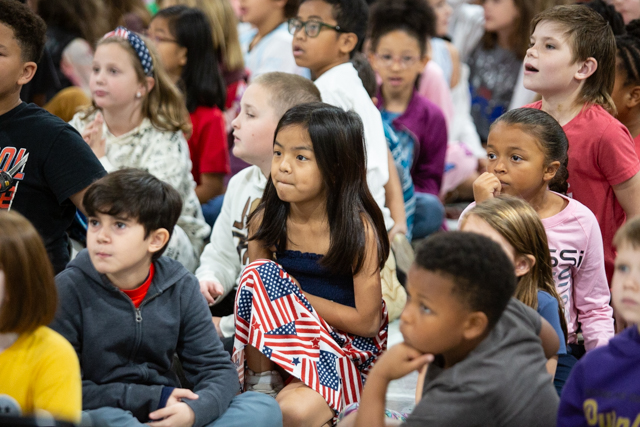Bill proposes partisan school board elections
Published 6:00 am Sunday, February 16, 2025
BY DAVID MAMARIL HOROWITZ
david.horowitz@bgdailynews.com
A House bill proposes requiring candidates’ political parties to be displayed on the ballot for school board elections and incorporating primary elections for county school boards statewide. The Kentucky School Board Association and multiple local board members said they oppose the bill.
Trending
Proponents of House Bill 169, such as sponsor Rep. TJ Roberts, R-Burlington, state it will enhance transparency and provide voters upfront with information they’re seeking to help them make more informed votes.
Opponents, such as the Kentucky School Board Association and local board members, said bringing partisan politics into school districts — rather than focus solely on serving students, regardless of political affiliations — would do students a disservice, and that the bill could dissuade future candidates from running.
“The spirit of this bill is to just add transparency,” said Roberts, adding that he’d hear from constituents that they’d want to know school board members’ political parties when he was knocking on doors. “In many ways, (knowing a candidate’s political party) is one of the easiest ways to get an idea of what one’s philosophy is in regard to education policy …
“I don’t believe that non-partisan elections exist in the first place. I believe once you put your name on the ballot, politics is now fundamentally what you’re doing.”
Added his co-sponsor, Rep. John Hodgson, R-Jefferson, “… I get a flood of calls every election cycle with constituents asking who the school board candidates are, and what they stand for. A notation of party affiliation would give some clue as to the values set they each represent so people can vote more intelligently.”
For county school boards, each board seat that oversees a district within a school district would have a primary election, Roberts said. For instance, a school district’s district three election could have a Republican nominee, a Democrat nominee, a Libertarian nominee if they ran, a Green nominee if they ran and so on, along with independents who meet the requirements, he said.
Trending
The bill would also add straight-ticket voting to county school board elections, which would enable voters to pick all of a political party’s candidates with one mark on the ballot.
Primary elections would be limited to county school boards because independent school boards are part of a very different system that would require an overhaul to incorporate primaries, Roberts said. So, the primaries would be limited to county school boards in the interest of efficiency, he said.
The bill would also require all independent school board elections to be on the same date as the general election.
School board opposition
The proposal is unpopular among school boards statewide and locally. Six board members across Warren County Public Schools and Bowling Green Independent School District who responded to the Daily News before press time expressed opposition, while one shared insights without taking a side.
A notable opponent is KSBA, a nonprofit that has, for decades, advocated for and represented 857 local board seats across Kentucky’s 171 public school districts.
This is despite the organization generally refraining from taking a formal position on pieces of legislation. The exception, KSBA Spokesperson Josh Shoulta said, is when KSBA’s board of directors approves its taking a position, and the board feels that a stance “reflects broad consensus among our members.”
It’s not the first time this kind of bill has been proposed, he and multiple board members said. KSBA has traditionally been against this type of legislation, Shoulta said.
Ahead of the 2024 legislative session, a KSBA survey that elicited 180 unique responses from school board members statewide (about 21% of the 857 members) found that 94% of respondents voted that local school boards should remain non-partisan offices, according to Shoulta. Asked how primary races would impact their consideration for running for another term, 55% of respondents indicated they’d be less likely, 4% indicated they’d be more likely, and 41% indicated it’d have virtually no impact.
“We should be looking for ways to strengthen and expand the pools of people who’d want to serve on local school boards, and I believe this legislation would actually have the opposite effect,” Shoulta said. “Fewer people would be interested in running for their local school board if they had to subject themselves to a partisan litmus test to do so.”
“We think that in today’s hyperpartisan climate, that would only encourage more broad-brush thinking.”
Partisan races could pull attention away from issues central to district oversight, he added.
“An example: If we move school-year elections partisan, and a school board member then has to run in part on (a party) platform and seek that party’s endorsement, they would then kind of be beholden to issues that are not necessarily critical to education,” Shoulta said. “All of a sudden, a school board member’s views on something like the war on Ukraine may have bearing on whether someone might vote for them, when in reality that issue has very little if anything to do with the reasons they ran for school board to begin with.”
The two BGISD board members who responded before press time, BGISD board members Mike Bishop and Frank “Hamp” Moore, both expressed opposition. WCPS board members Jen Kash, Garry Chaffin, Adam Jackson and Thomas Manco expressed opposition; Vice Chair Amy Duvall said she saw both sides to it — that while many in her last campaign would ask for her party affiliation, the bill could deter good candidates.
The overwhelming consensus: Party politics should stay out of school districts, nearly all said.
“Politics has no place on a school board,” Jackson said. “I ran for this position to serve the students and staff of WCPS, not a political agenda. When board members focus on party lines instead of our schools, it stops being about the kids and starts being about politics. That’s not what education should be about …
“If you’re running for a school board based on party affiliation instead of what’s best for kids, then you’ve already lost sight of what truly matters.”






